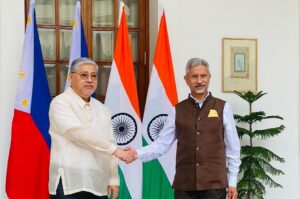The Philippines and India at 75: From distant neighbors to vital Indo-Pacific partners
THE Philippines and India share deep cultural and civilizational relations spanning hundreds of years. However, both nations were faced with new strategic challenges following the emergence of the Industrial Revolution, the heightened nature of inter-state competition, and the de-colonization process of the 20th century. Accordingly, with the Philippines and India gaining their independence in 1946 […]

THE Philippines and India share deep cultural and civilizational relations spanning hundreds of years. However, both nations were faced with new strategic challenges following the emergence of the Industrial Revolution, the heightened nature of inter-state competition, and the de-colonization process of the 20th century. Accordingly, with the Philippines and India gaining their independence in 1946 and 1947, respectively, the burgeoning structural dynamics of that period called for an urgent recalibration of foreign and security policies in Manila and New Delhi. As this year marks the 75th anniversary of diplomatic relations between the Philippines and India, it is crucial to understand and appreciate the evolution of bilateral security ties and the long-term potentials that this partnership possesses.
When Manila and New Delhi established diplomatic relations in November 1949, bilateral ties were immediately put the test by the challenges that stemmed from the unfolding systemic power competition between the United States of America (US) and the Soviet Union. While the Philippines and India had no direct conflict throughout the second half of the 20th century, the potential for any meaningful security collaboration was clouded by the Cold War dynamics, leading Manila and New Delhi to view each other from opposite sides of the ideational fence.
Consequently, the end of the bipolar era, along with the rise of an assertive China, and the overarching US-China power competition in the Western Pacific, provided opportunities for both countries to explore new dimensions in their relationship amid emerging structural realities.
For New Delhi, this willingness was signaled through its Look East Policy of 1991. In 2006, the meeting between the presidents of both countries led to the signing of a Memorandum of Understanding (MoU) on Defense and Security Cooperation to serve as a blueprint for long-term strategic cooperation. However, bilateral relations were still largely confined to issues of low politics, possibly due to Manila’s inward security perception and the limits of India’s willingness to translate its growing material capabilities into a robust and proactive foreign policy in Southeast Asia.
However, as the second decade of the 21st century began, China began pursuing a more overt expansionist approach towards the greater South China Sea and the West Philippine Sea in particular, Against this backdrop, the administration of former President Benigno Aquino III reoriented Manila’s security outlook from internal to territorial defense, with a particular emphasis on maritime security. This shift also allowed Manila to cast the net wider vis-à-vis its cooperation with like-minded Asian states like India. Accordingly, the first Joint Commission on Bilateral Cooperation (JCBC) meeting was held in 2011, while the first Joint Defense Cooperation Committee (JDCC) was established in 2012.
Such mechanisms were developed to institutionalize and enhance strategic cooperation between India and the Philippines, thus paving the way for joint military activities and arms transfers. However, Manila-New Delhi defense ties remained basic for several reasons, among them, was Manila’s lack of interest to diversify security partnerships away from the US and its extended alliance network and New Delhi’s initial reluctance to involve itself more overtly in the South China Sea, given the potential ramifications for Indian Ocean security.
Nevertheless, these impediments were eventually overcome in 2016. Under the administration of former President Rodrigo Duterte, Manila sought to radically reconfigure Philippine foreign policy to decrease the momentum in Philippine-US security ties and deepen Philippine-China relations. However, to appease Beijing for economic concessions, Duterte undermined Philippine sovereignty and sovereign rights in the West Philippine Sea. With China’s growing belligerence in Philippine waters, Manila needed to consider partner diversification. Among the benefits of Duterte’s external policy was opening doors for a more robust Philippine-India defense partnership.
This also aligned with Indian Prime Minister Narendra Modi’s desire for India to play a more prominent role as an alternative security and development partner in Southeast Asia through the Act East Policy. From 2016-2022, a series of crucial developments took place in the bilateral security partnership, including consecutive high-level visits from both sides, an increase in maritime security activities, and the sale of the BrahMos supersonic missile — making the Philippines the first recipient of this export from India.
These trends indicated Manila’s willingness to incorporate India into its security calculations and operationalize the growing partnership – an intent that was absent in the past decades. More importantly, with the emergence of the Indo-Pacific construct, Manila and New Delhi began to perceive one another as close, like-minded partners in a shared strategic space rather than distant neighbors from separate regions. As a testament to this acknowledgment, Philippine Navy flag officer in command Vice-Admiral Giovanni Carlo Bacordo stated the Philippines’ interest in bolstering maritime security cooperation with India to keep their shared seas safer.
Subsequently, when President Ferdinand Marcos, Jr. took office in June 2022, the Philippine-India security partnership was poised to strengthen further. The Marcos Jr. administration repositioned Manila’s foreign policy with the purpose of securing the West Philippine Sea against China’s expansionism. This converges with a rising India that seeks to strengthen the very foundations of that established order. In the past two years alone, several significant developments took place, such as signing an MoU for cooperation between the Philippine and Indian Coast Guards in August 2023, which would pave the way for a more institutionalized maritime security partnership.
Moreover, the fifth meeting of the India-Philippines Joint Defense Cooperation Committee (JDCC) in September was the first time to be co-chaired by the Defense Secretaries, indicating an elevation from the Joint Secretaries level during the 2023 JDCC in Delhi. Additionally, with the Philippines seeking to operationalize its Self-Reliance Defense Posture Act to modernize its Armed Forces, India has expressed support for capacity-building cooperation in the defense industry. Under the Modi Government, India has pursued its vision for “Aatmanirbhar Bharat,” or self-reliance in defense manufacturing. This opens pathways for possible joint production based on shared goals and interests in the region. Furthermore, both sides are also in talks to explore more avenues for arms trade and procurement amid the tumultuous landscape in the Indo-Pacific.
In addition, New Delhi has also become more vocal in supporting the Philippines’ legitimate position on the West Philippine Sea. This was illustrated when External Affairs Minister Dr. Subrahmanyam Jaishankar called for adherence to the 2016 Arbitral Ruling during his meeting with Philippine Foreign Affairs Secretary Enrique Manalo in July 2023. Moreover, During Mr. Jaishankar’s meeting with President Marcos Jr. in Manila in March, he stated India’s genuine intent to work with the Philippines to secure the seas based on international law. In doing so, the Indian Minister stated, “So if you want a country which actually says it will accept the judgment even if it goes against us, we are actually a natural candidate. So, we can be on your ship.”
Therefore, the Philippines and India have significantly enhanced the scope and depth of their bilateral security partnership throughout the years. In the past, relations were primarily confined to low politics, while functional defense cooperation barely figured in the strategic lexicon of both states. However, Manila and New Delhi overcame this cloud of unawareness. Given the uncertain future of regional geopolitics, it will be crucial for both partners to consistently explore new ways to enhance the function of their partnership according to the emerging challenges in the Indo-Pacific region.
Don Mclain Gill is a Manila-based geopolitical analyst, author, and lecturer at the Department of International Studies, De La Salle University, Manila.























